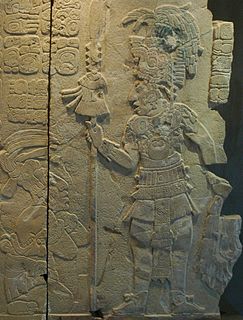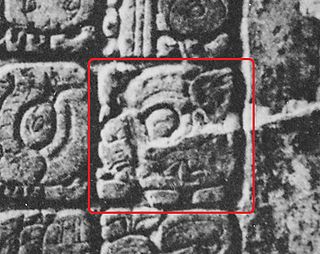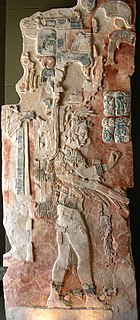
Year 612 (DCXII) was a leap year starting on Saturday of the Julian calendar. The denomination 612 for this year has been used since the early medieval period, when the Anno Domini calendar era became the prevalent method in Europe for naming years.

K'inich Janaab Pakal I (Mayan pronunciation: [k’ihniʧ xanaːɓ pakal], also known as Pacal, Pacal the Great, 8 Ahau and Sun Shield, was ajaw of the Maya city-state of Palenque in the Late Classic period of pre-Columbian Mesoamerican chronology. He acceded to the throne in July 615 and ruled until his death. During a reign of 68 years, the longest known regnal period in the history of the Americas, the 30th longest worldwide and longest until Frederick III in the 15th century, Pakal was responsible for the construction or extension of some of Palenque's most notable surviving inscriptions and monumental architecture.

K'inich Kan Bahlam II, also known as Chan Bahlum II, was ajaw of the Maya city-state of Palenque. He acceded to the throne in January, 684, several months after the death of his father and predecessor, K'inich Janaab Pakal I and ruled until his death.

Ajen Yohl Mat also known as Aj Ne' Ohl Mat, Ac Kan and Ahl Lawal Mat, was an ajaw of the Maya city-state of Palenque. He acceded to the throne on January 1, 605 and ruled until his death. He was probably son of Yohl Ik'nal or Sak K'uk' and brother of Janahb Pakal or K'inich Janaab Pakal I. During his reign, his kingdom was invaded on April 4, 611 by Scroll Serpent, ruler of the Kaan kingdom (Calakmul).

K'uk' Bahlam I, also known as Kuk and Bahlum K'uk',, was a founder and ajaw of the ruling dynasty at the Maya city of Palenque. He founded the dynasty on March 10, 431.

B'utz Aj Sak Chiik, also known as Manik,, was an ajaw of the Maya city of Palenque. He took the throne on July 28, 487, reigning until 501. Probably he was brother of Ahkal Mo' Nahb I.

Ahkal Mo' Nahb I, also known as Chaacal and Akul Anab I,, was an ajaw of the Maya city of Palenque. He ruled from June 5, 501 AD to his death.

K'an Joy Chitam I, also known as Hok, Kan Xul I and K'an Hok' Chitam I, was an ajaw of the Maya city-state of Palenque. He took the throne on February 6, 529 at age 34, ending an interregnum that had lasted for a little over four years.

Kan Bahlam I, also known as Chan Bahlum I, was an ajaw of the Maya city-state of Palenque. He acceded to the throne on April 6, 572 at age 47 and ruled until his death. Kan Bahlam was most likely the younger brother of his predecessor, Ahkal Mo' Nahb II and probably son of K'an Joy Chitam I. He was the first ruler of Palenque to use the title K'inich, albeit inconsistently. The title is usually translated as "radiant" but literally means "sun-faced".

K'inich Ahkal Mo' Nahb III also known as Chaacal III and Akul Anab III,, was an ajaw of the Maya city of Palenque. He took the throne on 30 December 721, reigning until c.736.

K'inich K'an Joy Chitam II, also known as Kan Xul II and K'an Hok' Chitam II, October 31, 644 – c.721, was an ajaw of the Maya city of Palenque. He took the throne on May 28, 702 (9.13.10.6.8), reigning until c.721. He succeeded his elder brother K'inich Kan Bahlam II. Their father was K'inich Janaab Pakal I, who had ruled for 68 years, and their mother was Lady Tz'akbu Ajaw. His possible brother could be Tiwol Chan Mat. K'inich K'an Joy Chitam apparently reigned for about nine years. He was captured by the Toniná in 711 and was possibly executed by their leader, K'inich Baaknal Chaak or was later restored to his kingship. He was succeeded in late 721 by K'inich Ahkal Mo' Nahb III.

"Casper", also known as 11 Rabbit,, was an ajaw of the Maya city of Palenque from August 9, 435 to 487. He was the immediate successor of K'uk' Bahlam I, who founded the ruling dynasty.

During the 7th and 8th centuries in Mesoamerica, there was an evident shift in the roles women played in ancient Maya society as compared with the previous two centuries. It was during this time that there was a great deal of political complexity seen both in Maya royal houses as well as in the Maya area. Warfare was a significant factor in political competition and marriage was one of the ways that alliances were made between the different polities. This was accompanied by a shift in women's roles from wife and mother to playing integral parts in courtly life, such as participating in rituals involving the supernatural world and at times ruling individual polities.
K'an Mo' Hix,, was a nobleman of the Maya city-state of Palenque. He was husband of Sak K'uk', queen of Palenque, and father of K'inich Janaab Pakal I, who was one of the greatest rulers of Palenque and was responsible for the construction or extension of some of Palenque's most notable surviving inscriptions and monumental architecture. He could be a possible father of Ajen Yohl Mat.
Janaab Pakal III, also known as 6 Cimi Pakal,, was an ajaw of the Maya city of Palenque. He acceded to the throne in November, 799. He was probably last ruler of Palenque and his glyph name comes from blackware vase found in the residential quarter of city.

K'inich K'uk' Bahlam II, also known as Bahlum K'uk' II and Mahk'ina Kuk,, was an ajaw of the Maya city of Palenque. He acceded to the throne on March 4, 764 and ruled until c. 783. He was a son of K'inich Ahkal Mo' Nahb III and Lady Men Nik. Knowledge of him is limited to a few broken monuments: the Tablet of the 96 glyphs, the Creation Tablet, the House B Mural? and Bodega no. 218.

K'inich Janaab Pakal II, also known as Upakal K'inich,, was an ajaw of the Maya city of Palenque. He ruled c.742 and he was probably brother of K'inich Ahkal Mo' Nahb III. There are only few details about his reign like Bodega no. 1144 and portraits on a stucco-covered pier from Temple 19, only date from his reign is from 742, when he inslalled lord into important office.




















